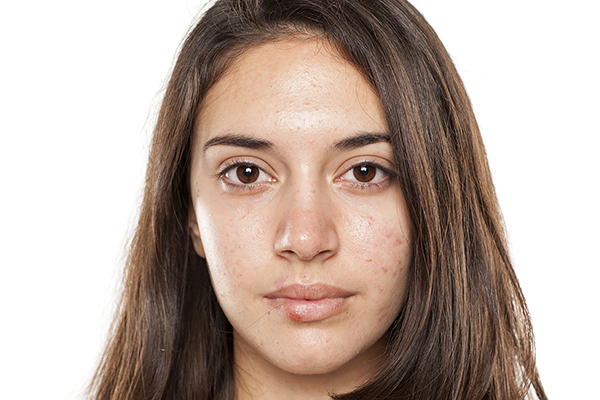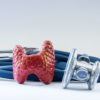Come puberty and the outlook of an adolescent changes altogether – the gush of hormones in the body with some desired changes and others undesirable. It can be quite an embarrassment for a teenager to have acne, but it can be perplexing if the acne doesn’t budge even in adulthood. Many women have troublesome experiences dealing with the two worst enemies – PCOS and acne.
As such PCOS symptoms shows up with both physical and psychological manifestations. The presence of embarrassing acne adds further to many women’s woes.
While over the counter PCOS acne remedies might provide temporary relief, management of PCOS and acne requires a structured approach with periodic evaluations of endocrinologists and dermatologists.
What is PCOS and why does it cause acne?
Polycystic ovary syndrome (PCOS) is an endocrine disorder that affects women’s ability to be fertile and conceive. It is a complex condition that causes high cholesterol, and insulin resistance.
However, the main characteristic feature of PCOS is elevated levels of male hormones. It is also characterized by enlarged ovaries due to the hormonal disorder. Additionally, other side effects such as abnormal hair growth, irregular periods, weight gain, and severe acne are noticeable in many women.
Types of PCOS
Not all women experience PCOS in the same way. PCOS and acne might not be the characteristic every woman with PCOS has. This is because PCOS manifests itself in different ways. PCOS symptoms mimic many other conditions, and are varied. That is why PCOS is classified into four types.
PCOS characteristics:
- Oligomenorrhea with or without anovulation (O)
- Hirsutism (unwanted hair generally on face, chest & back) with or without higher levels of male hormones (androgens) (H)
- Presence of multiple cysts on the ovaries with no other endocrine disorder (P)
Based upon these three characteristics, women might have PCOS in the following types.
- P+H+O: Women experience PCOS symptoms of oligomenorrhea with or without anovulation, Hirsutism with or without higher levels of male hormones, and presence of ovarian cysts.
- O+H: In this type, women experience oligomenorrhea with or without anovulation, and Hirsutism with or without higher levels of male hormones.
- H+P: In this type, women experience Hirsutism with or without higher levels of male hormones, and ovarian cysts.
- O+P: Women experience oligomenorrhea with or without anovulation, and ovarian cysts.
Women who have higher levels of male hormones are more likely to have PCOS acne.
What’s the connection between PCOS and acne?
What is acne?
Acne is a chronic skin condition that is caused when hair follicles are blocked and infected. Excess oil production, dead skin cells trapped deep in skin pores, bacteria, and poor hygiene cause hair follicle blockage.
PCOS and acne:
This is caused due to hormonal imbalance. Ovarian cyst symptoms occur due to an endocrine disorder that disrupts the hormonal balance in the body by producing high levels of male sex hormones called androgens.
Testosterone hormone is responsible for triggering excessive release of oil in the sebaceous glands, which creates a perfect breeding ground for acne. These excess oils mix with dead skin cells and other particles to clog follicles thereby leading to skin breakouts. In other words, PCOS causes elevated levels of male sex hormone in the body that eventually increases the likelihood of PCOS acne.
PCOS and Acne Symptoms
Hormonal imbalance in polycystic ovarian syndrome can cause several skin-related symptoms that include:
- Acute acne
- Skin tags
- Oily skin, and dark patches of velvety skin, medically known as acanthosis nigricans.
PCOS can cause skin tags (solid lumps of skin) that typically show near the armpits, neck or along the brassiere line area. Hives and psoriasis are other skin conditions that are sporadic.
How does PCOS cause Acne?
Excess oil that is secreted from the sebaceous glands can trigger acne. Testosterone, one of the androgens, causes excessive oil secretion in the sebaceous glands. Women with ovarian cyst symptoms or polycystic ovarian syndrome (PCOS) have this in abundance due to the hormonal disorder.
When excess oil on the skin gets mixed with the dead skin cells and other particles that are present, it can get trapped and plug hair follicles. When these plugs are open they create blackheads. When they are not open, they produce whiteheads. Blackheads and whiteheads are common skin problems, but the real problem occurs when these get infected. They develop into acne.
Formation of breakouts:
- Comedones: whiteheads (closed comedones) and blackheads (open comedones)
- Papules: inflamed bumps, small and raised
- Pustules: Red bumps with pus at the top
- Nodules: Often painful these are solid lumps beneath the skin’s surface
- Cysts: These infections are painful and contain pus and they are beneath the surface of the skin
PCOS acne is caused due to elevated levels of male hormone, testosterone. Other reasons include:
- Improper diet
- Inadequate sleep
- Low thyroid function
- Low adrenal function
- Fatty liver
- Poor gut bacteria balance
- Poor fat metabolism
- Hereditary or genetic connection
- Stress and depression
PCOS Acne Treatment
PCOS acne can be treated in a number of ways. Endocrinologists and Dermatologists assist women with ovarian cyst symptoms with an appropriate treatment plan.
Over the counter (OTC) medications:
OTC medications like acne lotions, cleansers, and creams provide temporary relief.
Prescription Treatments:
Endocrinologists and dermatologists prescribe stronger medications to treat acne that are more effective than OTC medications. These include diuretics with anti-androgenic effects, topical medications, and other PCOS medications.
Antibiotics:
In extreme or severe cases, doctors prescribe antibiotics to heal the infection in order to kill the skin bacteria.
Oral contraceptives:
Birth control pills have shown positive results in dealing with PCOS acne, and in helping regulate hormone levels.
Other therapies for PCOS acne
Based on the degree of severity, endocrinologists and dermatologists may recommend other different therapies for existing scars of PCOS acne:
- Laser therapy
- Light therapy
- Chemical peels
- Microdermabrasion
Skin care for PCOS acne
Women with PCOS acne need special skin care apart from managing PCOS. These include:
- Dietary modifications with anti-inflammatory diet, probiotic diet
- Skin hygiene with washing, using oil-free moisturizers
- Using non-comedogenic makeup
- Vitamin A serum for skin
- Vitamin C serum for skin
- Cleansing skin with glycolic acid














